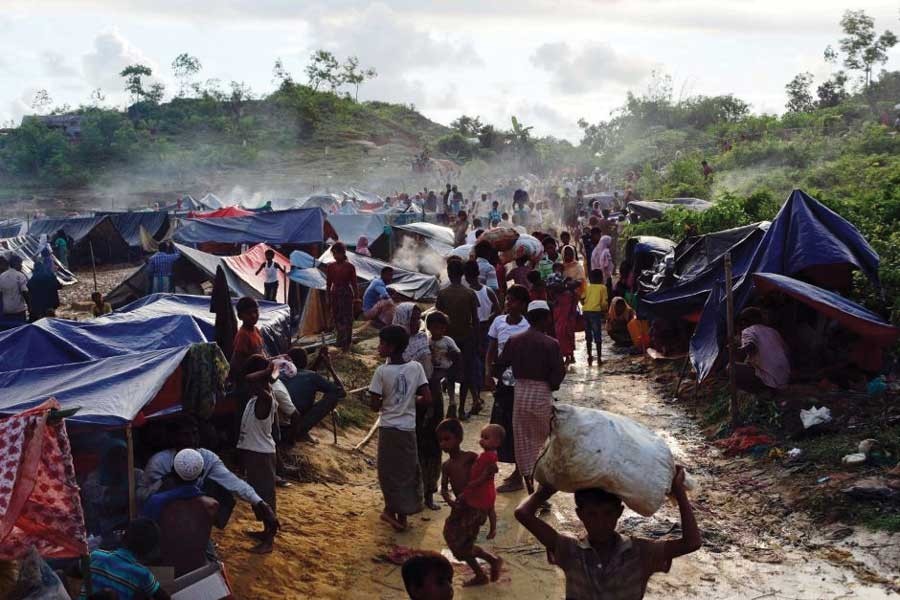With the anti-junta movement led by the so-called National Unity Government (NUG) in exile gaining momentum in Burma, the leadership of the NUG has been trying to reach out to the Rohingya community.
Inviting the Rohingya to 'join hands' with the 'Spring Revolution', the resistance movement to end military rule in Burma, the NUG leaders have also made some pledges that are close to the Rohingya's heart. Those include repatriation of the Rohingya who fled to Bangladesh following 2017's bloody military crackdown in western Rakhine state and granting citizenship to Rohingya people. The Rohingya should have jumped at the offer. But they are circumspect. And they have reasons to be so.
However, the anti-junta movement seems to be very serious about their commitments. Last month, the pro-democracy, anti-junta activists took to the social media posting their pictures wearing black and flashing three-finger salute of resistance. All this was meant to demonstrate their solidarity with the Rohingya. The posts sent to the social media bore the hashtag, '#Black4Rohingya'.This is undoubtedly an extraordinary development in a country where once even uttering the word 'Rohingya' was an anathema.
But General Min Aung Hlaing's most brutal way of suppressing the anti-junta, pro-democracy demonstrations in Burma has been instrumental in making foes into friends. Small wonder that the Rohingya who were earlier treated as political pariahs have now become potential partners in the anti-junta movement! Given the desperation of the resistance movement leaders to get as many enemies of the military junta as possible under the single umbrella a united front abroad, it is no surprise that they have finally held out an olive branch to the Rohingya. Believing that the movement leaders' offer towards the Rohingya is sincere and not made out of pure political expediency, the development can be considered a mark of political maturity on the NUG leaders' part. However, for a people who are the most persecuted, deprived of all human rights and hated by most Burmese Buddhists, there is no reason for them (a small portion of the original population, numbering some 600,000, surviving in ghettoes in despicable condition in the Rakhine state) to respond to the NUG's offer with open arms. In fact, the political platform of the anti-junta movement is basically comprised of the lawmakers from and members of the deposed leader Aung San Suu Kyi's National League for Democracy (NLD). Also, in the 32-mmber cabinet of the NUG, there is no representation from the Rohingya.
The Rohingya cannot still forget the fact that NLD's supreme leader, Suu Kyi, was not even ready to recognise the Rohingya community's separate ethnic identity,' but referred to them as 'Muslims living in Rakhine'. It is hard to believe that Suu Kyi, a Nobel laureate, has no knowledge of Burmese history or that she is not aware of the long history of the Rohingya people, their culture and their existence over the millennia in Arakan, now the Rakhine state. In fact, just to appease the military and dance to its tune, she found it convenient to forget history. Worse, she even did not see any human rights violation, far less an ethnic cleansing or genocidal campaign, to have taken place in the Rakhine State. Even to defend the Burmese military's annihilation campaign against the Rohingya, she travelled to the UN's top court in the Hague to convince the world that everything was hunky-dory in the Rakhine state.
The NUG has not yet denounced or made its position clear about the NLD leader's stance on the Rohingya as well as what the Burmese military did in the Rakhine state in 2017.
But the Rohingya's (of those still staying in Rakhine) nightmare is yet to be over. For there is the fear of further persecution against them by the Burmese military. In fact, the military has already threatened the remaining Rohingya living in displacement camps of Sittwe and elsewhere with consequences if they, according to the military, do not behave properly. Many of these Rohingya fled their homes after the ethnic Rakhine Buddhists burnt down their homes and chased them out of their ancestral abodes in 2012. Let us hear what these Rohingya of displacement camps in western Rakhine have to say.
The Burmese military, immediately after the February 1 coup, went to visit some of those Rohingya camps in Sittwe. They sat with them in a meeting, uttered words of assurance and asked them to remain calm. But when some of the Rohingya queried if they would be returned their rights, too, the soldiers got infuriated and reminded them that they were not 'Rohingya' , but Bengalis. At the same time, they (the soldiers) threatened to shoot them.
So, there should be no confusion about the situation of the Rohingya still living in the western Rakhine.
In that case, it would be too much to expect any instant response to the NUG's offer from these marginalised Rohingya. Moreover, what is the guarantee that the NUG, if it ever comes to power, would honour the pledge now it is making? As such, the Rohingya are naturally wary. When approached by journalists, the Rohingya of Sittwe camps made no secret of what they really want. They said they were ready to cooperate with any quarter, be it the NUG, the NLD or even the military. The only condition is that the partner will give the Rohingya back their rights.


